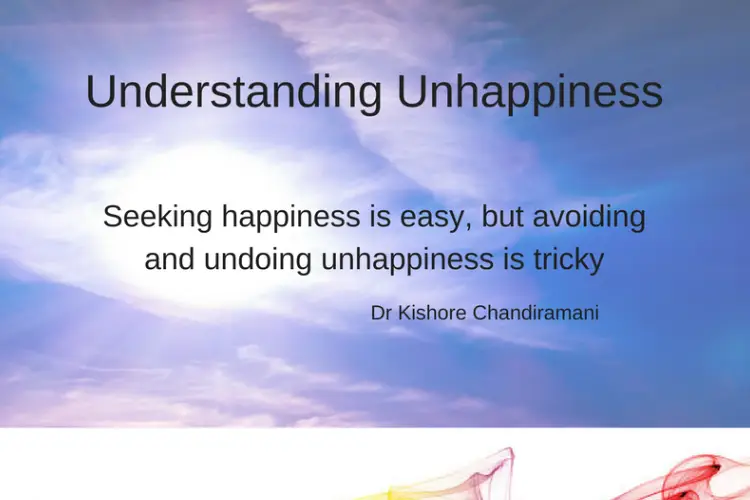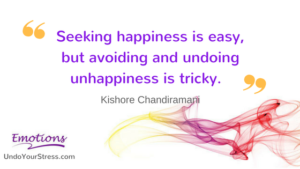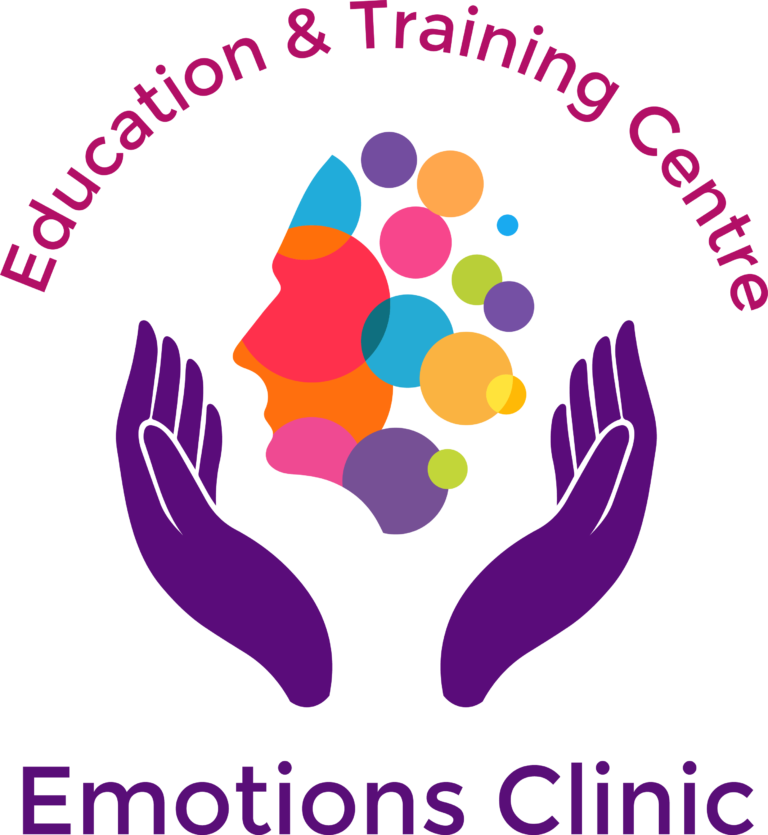Download one or all of the FREE six session integrative approach to stress management audio sessions – click here
Blogs

Understanding Unhappiness
Looking at this topic, Understanding Unhappiness, you must be thinking “I don’t need someone else to tell me what unhappiness is, I know it damn well, and also what causes it”. But let me tell you the language that we use to convey our negative emotions can be misleading, and it needs to be understood properly.
The word “unhappiness” should literally mean “not being happy”, it should not mean being sad, anxious, fearful or dissatisfied. Unfortunately when we use the word “unhappiness” we mean negative emotions of all kind, as if there is no middle ground where we are neither happy nor unhappy.
The problem with this conventional way of thinking is that when we are unhappy we try to seek happiness to undo it, which is the root cause of our inability to deal with the unhappiness..
When we are anxious or depressed seeking happiness will not undo the emotion, it will only suppress it or shift it to one side. A negative emotion has to be dealt with on its own terms, creating a positive experience can only give us the courage to face the negative but we must have the skills to undo these negative emotions.

“Don’t worry be happy”, sadly we hear this all the time from people but nobody tells us how not to be unhappy. Our mind has a tendency to naturally drift into negative emotions and memories rather than dwelling on the positive, whereas experiencing positive emotions apparently requires some effort.
How do we explain this; if we have a choice to think what we want to think why would we want to think of the negative and not the positive.
Happy or Unhappy – A Choice?
When it comes to doing something, we can easily make a choice of doing things that make us happy and not do things that cause negative emotions, but when it comes to thinking it works the other way around.
Let us examine this.
The mind is programmed in such a way that, whilst thinking and reflecting, it first goes to the negative experiences before it allows us to experience the positive. Perhaps this is an in-built mechanism which helps us deal with the negative first before letting us feel the positive.
We are therefore programmed to master the unhappiness or disappointment first before we can enjoy the positive; otherwise if left to ourselves, these negative experiences will never get worked on, and they will keep blocking our access to the positive ones and also to our inner peace.
I recently came across a Facebook post from Dr Srini Pillay, a Psychiatrist and Harward Professor, wherein he gives the example of a child who throws the toy and starts crying, when the mother brings the toy back to him he is happy for a while but soon after he throws it again and starts crying. The explanation given by Dr Pillay is – perhaps he is trying to master disappointment alongside seeking satisfaction.
It may be that we unconsciously create or seek situations that increase our distress so that we can learn new skills to handle them and become stronger. It is also possible that it works in relationships as well, as at times for no apparent reason one creates a situation wherein one can experience the pain of separation, either by actual separation or imagining it, so the one can deal with one’s relationship insecurities and loneliness alongside enjoying the togetherness.
The laws of psyche tell us that our negative emotions dissolve not in the positive experiences but only in the neutral/equanimous consciousness that can be harnessed through silence and solitude, and also through our non-reacting attitude to things.
The next logical question that comes to the mind is how to not-react, and respond appropriately to things, which can be learnt through various techniques. Some are discussed by the author on this website in the form of six audio sessions that can be downloaded free of charge.
Download Your Copy

Nature Consultancy Limited is regulated by CQC to provide care at Emotions Clinic
Phone : +44(0)1782 768656
Email : ad***@****************co.uk
Quick Links
Information
Head Office Address
Lumbung Hidup St 425 East Java Madiun City Block ABC 123
Days Open
Monday - Friday 08 AM - 10 PM


